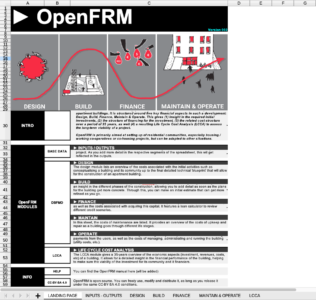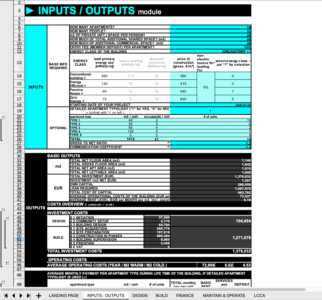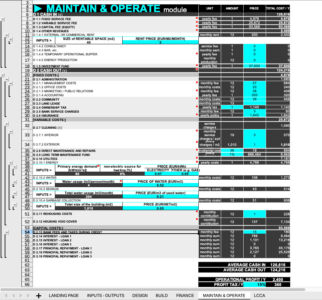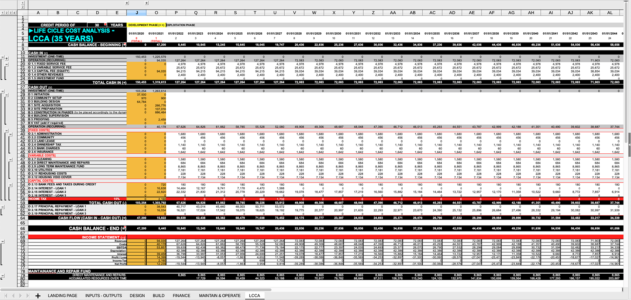OpenFRM – a financial design toolkit to kickstart housing co-ops
Initiating, constructing and operating a cooperative multi-apartment building is a daunting task. Not only due to the wealth of issues to be considered, but equally because envisioning and testing relevant development scenarios for such a building is a highly complex endeavour. However, it is precisely with this “design” of parameters that such a cooperative gains power over their future housing reality.
Triggered by a new wave of co-ops
The development of this toolkit has been tackled with a young, innovative group of coops in five Central and South-eastern European cities (Belgrade, Budapest, Ljubljana, Prague and Zagreb). The housing sector in their CSEE region has been in a crisis of accessibility, reliability and affordability for more than two decades. Since the privatization of the (collective) housing stock in the 1990s, private homeownership has now become dominant (often more than 95% in these countries) while the share of social housing is marginal. Given the low average household income in this region and the exorbitantly high prices of real estate, a deadlock exists for people looking for an independent and reliable living situation
It is not entirely surprising that this last group in recent years has taken the initiative to break through this stalled and “toxic” housing supply. They come to the same conclusion: where
Now, in five cities throughout the CSEE region, several emerging co-ops have joined forces in the MOBA network. They are about to realize their first residential building – each in their own context. A pioneering step, requiring knowledge to be able to properly determine the scope of the projects, to estimate the risks and to manage these both in the short (development) and long term (operation).
The open-source OpenFRM toolkit is developed to provide these insights. Driven by the pioneering work of MOBA participants and a development grant from the Creative Industries Fund NL, it is now available to any collective or professional tasked with this challenge.
Where to find OpenFRM
The tool can be downloaded as a zip package (including additional documentation) from the MOBA.coop website, or – for those more accustomed to open-source development – directly from its GitHub repository.
It comes in the form of an .ods file (OpenDocument Spreadsheet file). You can open the .ods file with LibreOffice or any compatible tool.
How OpenFRM works
The toolkit is built around a spreadsheet with six different modules: Inputs / Outputs, Design, Build, Finance, Maintain & Operate and finally the Life Cycle Cost Analysis (LCCA).
Navigating to the Inputs/Outputs module, primary date about a project can be entered. Important is to understand that
From here, a more detailed overview can get generated. The Design and Build module provides an overview of the actual investment into the project, the Finance module details the structure and cost of capital, while Maintain & Operate brings the logic of keeping the building up & running on the long-term. The LCCA module finally shows the cash-flow, financial performance and viability of a project over the long term (35-years).
Where further development takes place
The toolkit is provided as-is, under Creative Commons Attribution
OpenFRM is developed and maintained on the platform GitHub. This is an “industry standard” code hosting platform for version control (work on updates, upgrades) and collaboration – and thus will not need much explanation for those active in the open-source community. On GitHub, anyone involved can contribute to the further development of the tool or can file issues about the currently active “master” branch.
- [download ] zip package or repository on GitHub
- [team ] STEALTH.unlimited (Ana Džokić and Marc Neelen) and the team of Ko Gradi Grad (Who Builds the City, Belgrade), with a major contribution by Predrag Milić
- [background ] OpenFRM has been initiated by STEALTH.unlimited and the team of Ko Gradi Grad (Who Builds the City, Belgrade), and collectively tested and reviewed within the MOBA network in a series of successive workshops and technical validation sessions. This involves close consultation with the Cooperative for Ethical Financing (ZEF, Zagreb) and the collective Sociálni Inovátori (Bratislava). Creative Industries Fund NL has provided vital funding to develop it as a tool for the broader community of emerging housing initiatives and co-operatives.
- [timeline ] proof-of-concept January 2018; functional development August 2018 – February 2019, public release March 2019, launch GitHub repository October 2019





